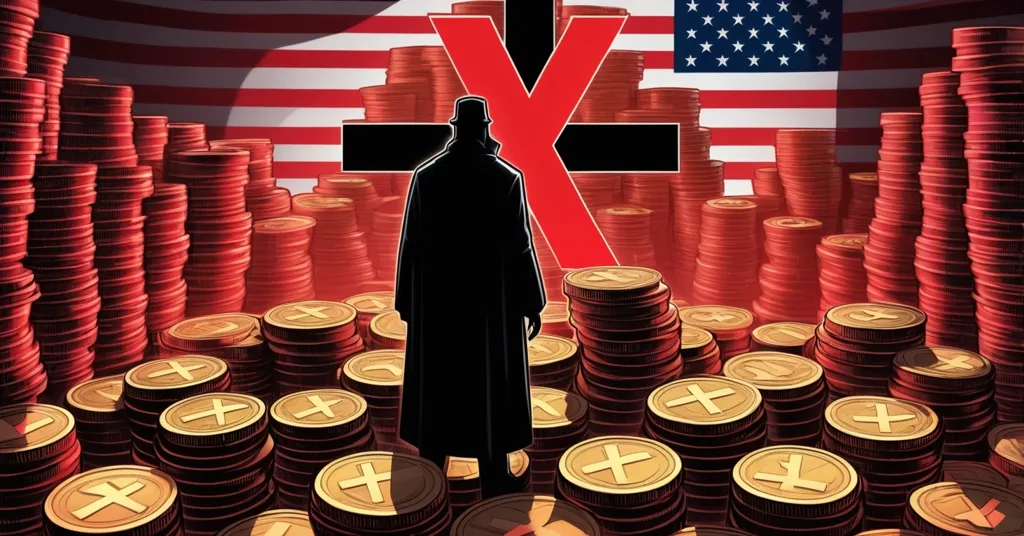U.S. Treasury Targets Huione Group for Alleged $4B Crypto Laundering Scheme

U.S. Treasury Proposes Rule to Block Huione Group Over Alleged $4 Billion Crypto Laundering
The U.S. Treasury’s Financial Crimes Enforcement Network (FinCEN) has taken decisive action against the Cambodian conglomerate, Huione Group, labeling it a “major target for money laundering investigations” due to its alleged involvement in laundering over $4 billion in illicit funds. This move aims to sever Huione Group’s ties to the U.S. financial system, targeting its network of businesses and the launch of a stablecoin designed to evade oversight.
- U.S. Treasury targets Huione Group for $4 billion in alleged crypto laundering.
- Huione Group’s businesses and the launch of USDH stablecoin.
- Actions by Tether and Google against Huione Group.
- Public comment period for the proposed rule.
- Broader implications for the crypto industry.
FinCEN’s proposed rule aims to block Huione Group from accessing the U.S. financial system, a significant step in the ongoing battle against money laundering facilitated by cryptocurrencies. This action follows allegations that Huione Group has laundered over $4 billion in illicit funds between August 2021 and January 2025, including support for notorious cybercriminal activities such as those carried out by North Korea’s Lazarus Group. A stablecoin, or a cryptocurrency designed to maintain a stable value often pegged to a fiat currency like the US dollar, like USDH, has been launched by Huione Group to avoid regulatory freezing, raising serious concerns about its use in laundering activities.
Huione Group’s operations span a network of businesses, including Huione Pay, Huione Crypto, and a Telegram-based marketplace now known as Haowang Guarantee. This conglomerate has been implicated in facilitating online scams, including the infamous “pig butchering” scams, where victims are lured into investing in fake cryptocurrency schemes. The launch of USDH, which Huione Group claims cannot be frozen, offers its clientele a virtually risk-free ecosystem to move or store convertible virtual currency (CVC) without the risk of interception or freezing by law enforcement, according to FinCEN’s rulemaking submission.
In response to these allegations, Tether took action in July 2024, freezing nearly $30 million in USDT linked to Huione accounts. Additionally, a July 2024 report by blockchain forensics firm Elliptic highlighted Huione as a hub for Southeast Asian cybercriminals, further solidifying the case against the conglomerate. Google, too, delisted Huione’s mobile app from the Google Play Store in January 2024 following these criminal allegations.
Treasury Secretary Scott Bessent emphasized the severity of the situation, stating:
“Today’s proposed action will sever Huione Group’s access to correspondent banking, degrading these groups’ ability to launder their ill-gotten gains.”
This statement underscores the Treasury’s determination to disrupt Huione Group’s operations and protect the integrity of the financial system.
The proposed rule is currently open for public comments for 30 days, starting May 1, 2025. This period offers stakeholders an opportunity to voice their opinions on the proposed action, which could have far-reaching implications for the regulation of cryptocurrencies and the fight against money laundering.
The crackdown on Huione Group is a positive step towards curbing illicit activities within the crypto space. However, it also highlights the broader challenges within the ecosystem. The advent of stablecoins like USDH designed to evade oversight poses a significant threat, yet it also underscores the need for more robust regulatory frameworks. As the crypto world continues to evolve, such actions by the U.S. Treasury signal a commitment to maintaining the integrity of financial systems while also revealing the ever-present tension between innovation and regulation.
On the flip side, while Bitcoin and other cryptocurrencies advocate for decentralization and financial freedom, they must not become a playground for bad actors. The potential for cryptocurrencies to revolutionize finance is immense, but it comes with the responsibility to ensure they are not exploited for illicit purposes. This case with Huione Group is a stark reminder that the crypto community must remain vigilant and supportive of regulatory efforts to weed out the bad apples without stifling the growth of the industry.
It’s high time the crypto space stopped being a playground for shady characters like Huione Group. The U.S. Treasury is playing financial whack-a-mole with crypto launderers, and while it’s necessary, we must also recognize that the decentralized ethos of cryptocurrencies should not be sacrificed at the altar of regulation. Bitcoin maximalists might argue that such regulatory actions are part of a broader attack on the freedom that Bitcoin represents, yet even the staunchest Bitcoin advocates must acknowledge the necessity of cleaning up the ecosystem to ensure its longevity and legitimacy.
While altcoins and other blockchain systems play important roles in niche areas that Bitcoin might not serve well, we must ensure that these innovations do not become tools for illicit activities. The case of Huione Group serves as a reminder that the promise of decentralization and financial freedom comes with the obligation to protect the integrity of the system. As champions of “effective accelerationism,” we must push for rapid technological advancement while also advocating for responsible use and regulation to prevent abuse.
Here are some key takeaways and questions to consider:
- What actions has the U.S. Treasury taken against Huione Group?
The U.S. Treasury’s FinCEN has proposed a rule to designate Huione Group as a “major target for money laundering investigations” and block its access to the U.S. financial system.
- What are the alleged activities of Huione Group?
Huione Group is alleged to have laundered over $4 billion in illicit funds, supported cybercriminal operations including North Korea’s Lazarus Group, and facilitated online scams like pig butchering.
- How is Huione Group evading oversight?
Huione Group launched a stablecoin, USDH, designed to be unfreezable, allowing it to move or store cryptocurrencies without the risk of interception or freezing by law enforcement.
- What businesses are part of Huione Group’s network?
Huione Group’s network includes Huione Pay, Huione Crypto, and a Telegram-based marketplace now known as Haowang Guarantee.
- What recent actions have been taken against Huione Group’s operations?
Tether froze nearly $30 million in USDT linked to Huione accounts in July 2024, and Google delisted Huione’s mobile app from the Google Play Store in January 2024 following criminal allegations.
- What is the current status of the proposed rule against Huione Group?
The proposed rule is open for public comments for 30 days before it can take effect, as of May 1, 2025.



